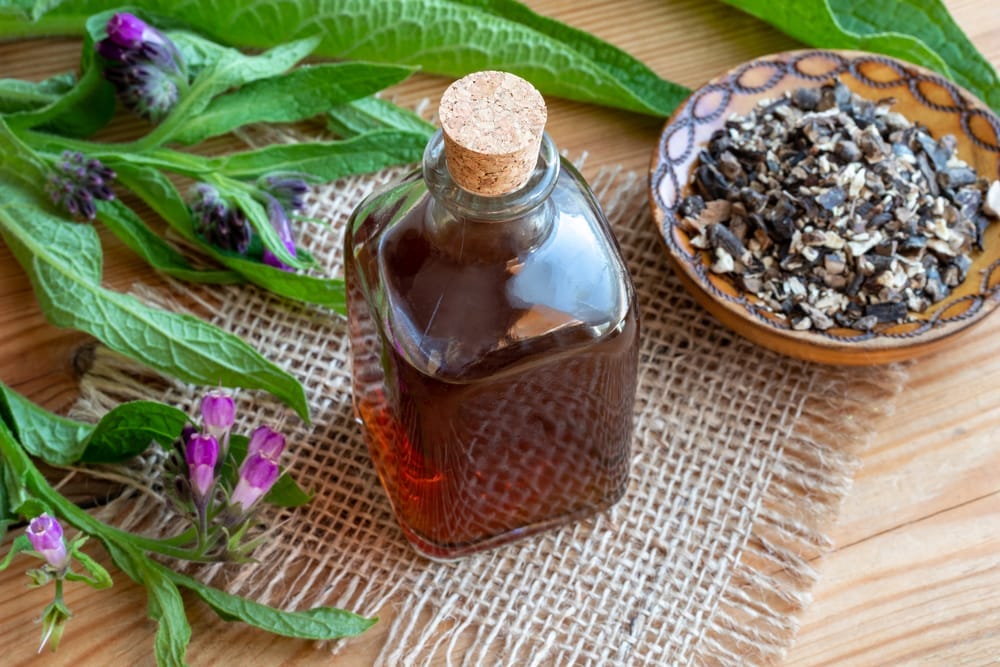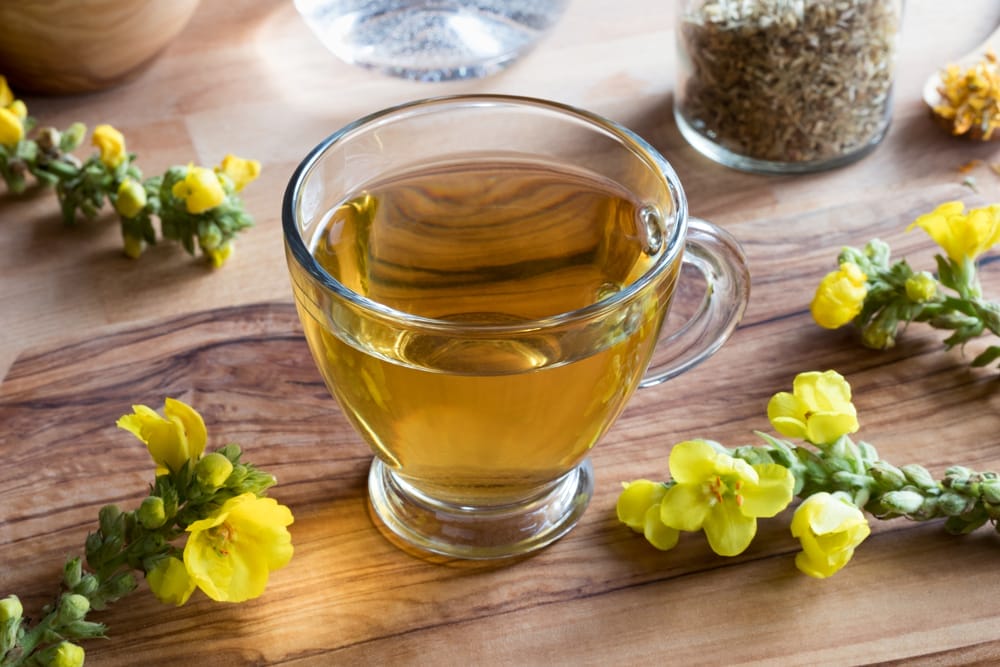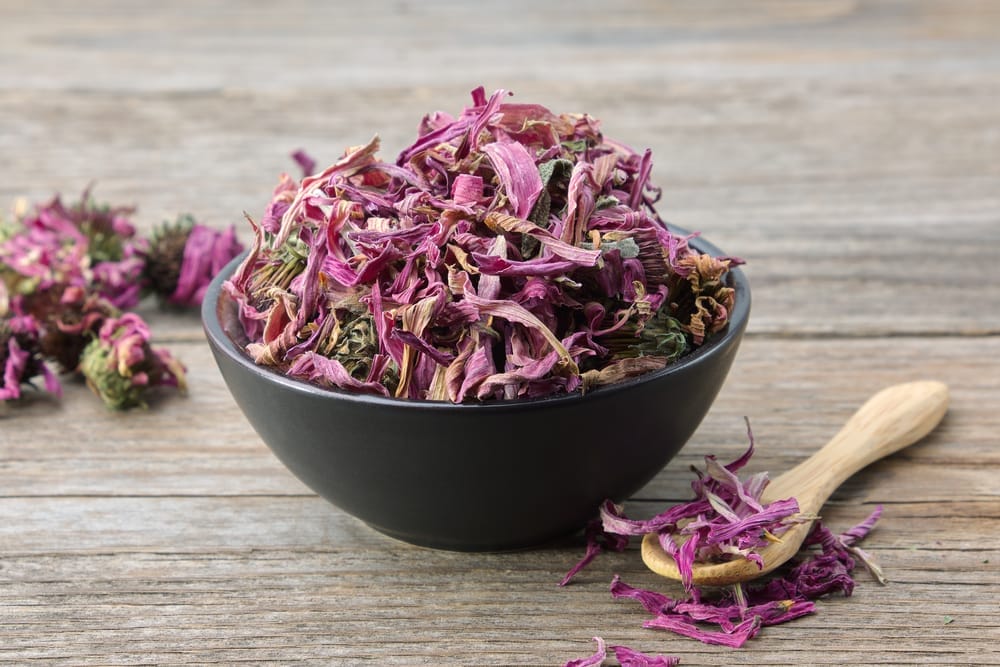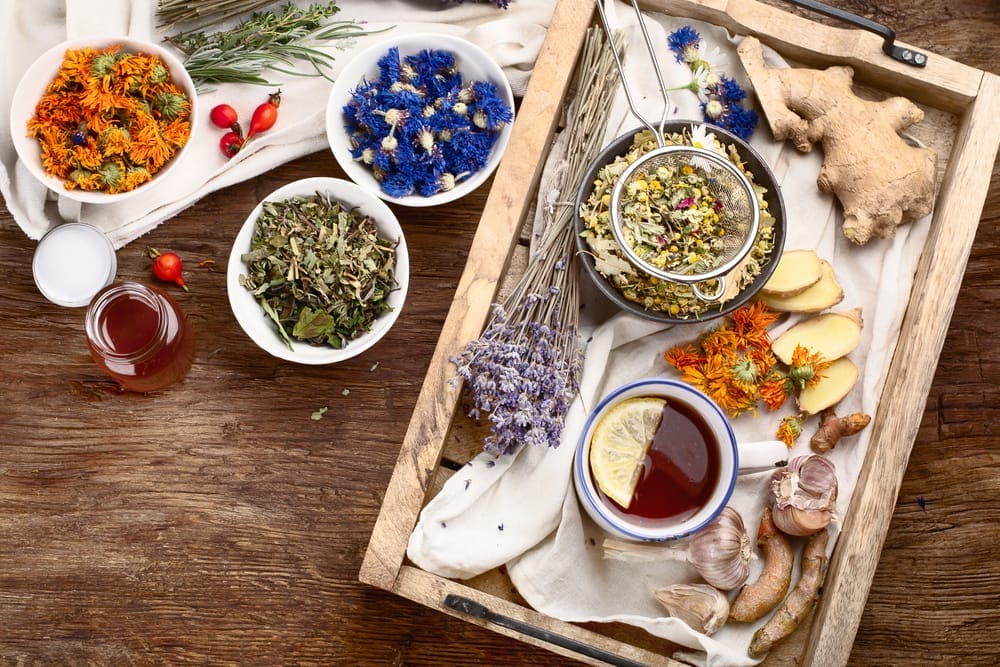The common cold is a common ailment that is the domain of the autumn and winter season. In the fight against colds we usually resort to traditional medicines and vitamin preparations. However, it is worth remembering that then we can also count on the help of nature and use the beneficial properties of herbs.
Both a runny nose, cough, sinus pain and other symptoms we face during a cold can be alleviated with herbal infusions and extracts. Also, the body’s natural immunity, our greatest ally in neutralizing pathogens, can be supported by a variety of medicinal plants. You just need to know which herbal ingredients to reach for and how to use them. Let’s take a closer look at herbs whose properties help build immunity and reduce cold symptoms. How to use the beneficial power of herbs in the battle for good health?
Table of contents
What promotes the development of colds? When do we get colds easily?

The common cold, or upper respiratory tract infection, sometimes running along with a fever, is our frequent companion. Colds affect us especially during the change of seasons and the colder months of the year. At that time, the immune system is weaker and has a harder time dealing with attacks from disease agents such as viruses and bacteria.
The main symptoms of the common cold are a runny nose, cough, sinus pain, headache, sore throat, hoarseness, sneezing, a subfebrile state or fever, weakness and general waking.
The frequency of going through colds sometimes varies. Many people struggle with them once or twice a year. However, there is also a large group of people who become victims of colds even several times a year.
What factors are particularly conducive to the development of colds? Why do we “catch” colds and coughs so easily?
- Exposure to viruses – frequent contact with people infected with viruses that cause colds increases the risk of “catching” the infection. Also, using public places where viruses are easily transmitted is a factor that increases the likelihood of infection. During periods when viruses are more common, such as the winter season, the risk of getting infected increases.
- Atmospheric conditions – low temperatures, constant cold, wind, precipitation, and dampness are all weather factors that promote declines in immunity and more frequent infections.
- Weakened immunity – in the elderly, children, pregnant women, people with chronic diseases, as well as peoplewith nutritional deficiencies, sleep deficiencies and those living under constant stress, the immune system can be weakened. The body is then more susceptible to attacks by viruses and bacteria and their easy multiplication.
What herbs for cold and flu?

Nature can be our best ally in the fight against the cold. When choosing herbs for a cold, it is worth paying attention to whether they have antiviral, anti-inflammatory and immune-boosting properties . It is definitely worth betting on medicinal plants that have a proven effect on the immune system and can relieve the most annoying cold symptoms, such as a runny nose, cough or sore throat. In the case of colds that run with a fever, inflammatory herbs will be a good option.
Herbs that strengthen immunity
Immunity is an important part of the functioning of our system. With a well-functioning immune system, our body is able to effectively repel attacks from pathogens and quickly resolve inflammation, colds and infections. Conversely, with low immunity, microorganisms are less effectively picked up by immune cells and quickly multiply, developing a severe infection.
Some herbs, such as echinacea, nigella, purge, membranous astragalus, ginseng, garlic, ginger, stimulate the production of immune cellsand enhance the body’s immune responses, thus playing a significant role in building immunity and protecting the body from colds. Their strengthening properties are an invaluable aid at times when the body is up against infections.
Check out a multi-ingredient dietary supplement that will help you quickly build high immunity: NuviaLab Immune.
Herbs for inflammation, warming and fever reduction
Warming and expectorant herbs stimulate blood circulation, speed up metabolism and increase thermogenesis (heat generation in the body). They also intensify sweating, thus stimulating the body’s self-cleansing and helping to get rid of pathogens responsible for illness faster. At the same time, they help bring down a fever.
Intense infusions of warming herbs combat chills, muscle aches and the feeling of constant cold that accompanies colds. They bring a moment of relief and promote the healing process.
The most popular warming herbs are: ginger, black bell pepper, cloves, chili bell pepper, elderberry. The most effective inflammatory herbs include lime, pansy, willow bark, birch leaf, poplar buds, among others.
Herbs for inhalation
Inhalations with herbs are an effective way for relieving annoying cold symptoms, such as blocked nose, breathing problems, troublesome cough, sinus pain. They decongest the airways, while helping to fight inflammation and germs and viruses.
To make an inhalation, all you need to do is prepare herbs (for example, such as mint, chamomile, fennel, juniper, thyme, pine needles, rosemary, anise) and boiling water. Then place the herbs in a bowl, pour the boiling water over them, lean over the bowl, cover your head with a towel and inhale the steam generated for a few minutes.
Expectorant herbs and shielding the mucous membranes of the throat and respiratory tract
Expectorant herbs work by diluting mucus lingering in the respiratory tract, making it easier to expectorate and speeding up the cleansing of the bronchi and lungs. Mucous membrane-covering herbs form a protective layer on the mucous membranes in the mouth and throat, moisten the throat, soothe irritation and prevent further development of infection.
Among the best expectorant herbs are thyme, coltsfoot, hyssop, soapwort, licorice and sage. As shielding herbs, on the other hand, it is worthwhile to choose black mallow, calendula, hollyhock, Icelandic lichen, rosemary or mullein. Thanks to their properties, expectorant and shielding herbs bring relief during a cold by supporting the natural processes of cleansing the respiratory tract and soothing irritation of the mucous membranes.
Antiseptic and anti-inflammatory herbs
Disinfectant and anti-inflammatory herbs fight bacteria, viruses and fungi that populate the respiratory tract and cause cold symptoms such as runny nose, cough and sore throat. At the same time, these herbs relieve inflammation and shorten the time of infection. By preventing the growth of microorganisms, they simultaneously strengthen the immune system.
Effective antiseptic, antibacterial, antiviral, anti-inflammatory herbs helpful in colds are: thyme, oregano, ginger, garlic, echinacea purpurea, stonecrop, willow, yarrow, honeysuckle, sage, Baikal thyroid.
Herbs for a cold – 10 effective ingredients

We can drink herbs for the common cold individually or combine them together in multi-ingredient herbal compositions. Such rich mixtures can prove to be a stronger weapon against infections (thanks to the synergistic action of the individual components). Single herbs are mostly effective, but mixtures of herbs have a more comprehensive and powerful effect.
What to keep in mind, when using herbs, whether singly or in mixtures, it is important to exercise moderation and follow dosage recommendations and frequency of consumption. This will allow us to avoid negative side effects.
What herbs for the common cold are particularly worth paying attention to?
Black elderberry
Elderberry is a medicinal plant that has been used for centuries to relieve cold and flu symptoms. It contains many biologically active substances that have beneficial effects on our immune and respiratory systems, including: flavonoids that have a strong anti-inflammatory effect, saponins that facilitate expectoration, anthocyanins that help fight virusesresponsible for colds and flu, as well as large deposits of vitamin C to strengthen immunity and shorten the time of infection. Elderberry infusions also have sudorific properties that help rid the body of pathogens faster and beat fever.
Lime blossom
Lime blossom is known for its inflammatory, antitussive and antipyretic properties. It also has a diuretic effect, which makes it easier to cleanse the body of bacteria and other pathogens, and has a positive effect on immunity. It reduces inflammation in the respiratory tract. It also exhibits good covering, moisturizing and softening properties, making it helpful for sore throats, hoarseness and coughs. Lime blossom infusions are recommended for flu and flu-like illnesses, tonsillitis, bronchitis, pharyngitis, catarrh, sinusitis.
Lanceolate plantain
Lancelet plantain has a special significance in folk medicine. It was used to help heal wounds and treat skin and digestive problems. But these are not its only assets. It is extremely valuable in the fight against colds. It also supports the immune system and accelerates tissue regeneration.
Babka has strong anti-inflammatory, antibacterial and antiviral effects, thus shortening the time and reducing the severity of infection. Thanks to its high mucilage content, it soothes irritation of the mucous membranes in the upper respiratory tract and forms a protective layer on their surface. It also has an expectorant effect. It is particularly helpful in wet coughs (facilitates expectoration of lingering secretions), but it also works well in dry coughs (has a shielding, soothing effect and eliminates scratching in the throat).
Thyme
Thyme is one of the leading herbs for the common cold. Thanks to its high essential oil content, equipped with valuable components such as tymol and karwakrol, thyme boasts a high effectiveness in fighting bacteria and viruses, leveling inflammation and disinfecting the respiratory tract.
Thyme is an effective remedy for soothing sore throats, sinus pain, bronchitis, runny nose and cough (both dry cough and wet cough). It exhibits an expectorant effect, helps thin mucus and facilitates its expectoration. In addition, the antioxidants it contains strengthen the body’s immunity and help fight infections. Thyme can be consumed in the form of infusions, inhalations and syrups.
Sage
Sage is not only a culinary spice, but also a herbal antidote for many ailments, including viral and bacterial infections. Consumed regularly, sage infusions are also a support for our immunity.
Sage has antiseptic, anti-inflammatory and antibacterial properties. It has an astringent effect, soothes irritation of the mucous membranes of the mouth and throat and accelerates their regeneration. Essential oils contained in sage leaves help clear the bronchi of lingering secretions. They also have an antipyretic effect. Thanks to its expectorant properties, sage helps to thin and remove lingering mucus, providing relief from coughs and runny noses.
Hibiscus
Hibiscus is a treasure trove of vitamin C, minerals and organic acids, among which protocatechuic acid plays an important role. It has excellent bacteriostatic properties, and what’s more, it has a very beneficial effect on the state of the skin (inhibits its aging). Hibiscus is also abundant in polysaccharides, anthocyanins and flavonoids. All these components play an important role in the treatment and prevention of colds.
Drinking hibiscus for an extended period of time is a good way to naturally boost immunity. The herb is also extremely useful when a cold begins to develop. It helps fight microorganisms and leads to a faster extinguishing of inflammation and infection. What’s more, hibiscus infusions can help lower fever, which is a common symptom of colds. Hibiscus will also work well for a persistent cough.
Marshmallow root
The main active ingredient is mucilaginous substances that coat the mucous membranes of the throat, protect the against harmful effects of microorganisms, soothe irritation, stimulate regeneration and reduce coughing. Thanks to its moisturizing and shielding properties, it is very helpful for dry cough and scratchy throat.
Legalise also exhibits strong anti-inflammatory effects, which help fight respiratory infections. Infusions and syrups made from lawson are popular remedies for coughs and hoarseness. They help relieve cold symptoms and speed up the healing process. They also have a soothing effect on such ailments as chronic rhinitis, vocal cord inflammation and tonsillitis.
Purple coneflower

Purple coneflower, or echinacea, boasts very good immune-modulating properties, which is good news for people with weakened immunity who often struggle with colds.
Hedgehog contains a rich array of compounds valuable to the immune system, including polysaccharides, glycoproteins, alkamides, caffeic acid derivatives, and flavonoids. Thanks to them, it stimulates the immune system to produce more defense cells, thus helping the body fight off viral and bacterial infections more efficiently. Purple coneflower also has an anti-inflammatory effect, so it relieves cold symptoms such as sore throat, runny nose and cough.
Raspberry leaf
Rich in flavonoids, tannins and organic acids, raspberry leaf exhibits intense anti-inflammatory, antibacterial, antiviral and inflammatory effects. It helps fight respiratory infections, reduces fever and stimulates the removal of toxins from the body. In addition, raspberry leaf contains a lot of vitamin C and minerals to support the immune system. Raspberry leaf can be consumed in the form of teas. Raspberry leaf infusions also work well as gargles to soothe inflamed throats.
Licorice
Licorice root is a seldom-used herb today, but one with great health-promoting potential. It is excellent for fighting colds and building immunity. The main active ingredient of licorice is glycyrrhizin, thanks to which it exhibits strong antiviral and anti-inflammatory effects. It blocks the proliferation of viruses, making it easier to fend off infection while it is still in a mild form, keeping symptoms from worsening.
Licorice is also distinguished by its good antibacterial properties. It also has an expectorant effect, thus helping to remove lingering mucus from the respiratory tract. It soothes coughs and runny noses, soothes an irritated throat and reduces pain.
What else relieves cough and runny nose – other home remedies for cold and flu
In addition to using herbs, other home remedies will work well during colds, such as:
- drinking onion syrup,
- drinking beet syrup,
- drinking milk with garlic,
- drinking syrup made from coltsfoot,
- inhaling the smell of horseradish,
- eating flaxseed with honey,
- drinking tea with ginger and lemon,
- using hot baths with medicinal plants such as rosemary, thyme, juniper, sage, chamomile.

